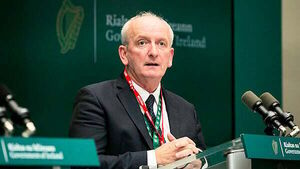HSE boss Bernard Gloster reiterates apology to ‘Grace’ for neglect in foster care

Vivienne Clarke
The chief executive of the Health Service Executive has rejected any suggestion that the HSE’s legal team had an adversarial approach in the commission of investigation into the ‘Grace’ case.
"That is something that absolutely was never reported to me or raised with me in the two years that I'm in this job," Bernard Gloster told RTÉ on Wednesday. "I did hear some reference to it in some commentaries yesterday.
"The team have absolutely assured me and we would have an expectation that people would conduct themselves well in a context like this.
"But can I say that every witness and every party before a formal statutory Commission of Investigation is subject to the direction of the chair. In this case, the chair was Margie Farrelly. And I have no doubt that everybody was treated fairly and appropriately, but there is no doubt that a process like this explores difficult questions and that's a difficult experience for everybody,” Mr Gloster told RTÉ radio’s Morning Ireland.
Mr Gloster said he wanted to restate an apology to ‘Grace’ and to her mother. He said what happened was “absolutely truly shocking, even by the standards of the 1990s.”
When asked why the HSE had not been in a position to tell the Commission of Investigation who made the decision not to remove ‘Grace’, he said the HSE had put forward all of the information it had and answered questions truthfully. “Witnesses appeared before the Commission, they were examined, they were cross-examined indeed.”
Mr Gloster said he was not aware of any withholding of information, “in fact before the Commission was established there were allegations of suppression of information, and I think the investigation finds that that was not the case.
“My understanding is that everything that was made available to the Commission, there have now been six reports into the case of ‘Grace’, starting with the Divine Report, the Resilience Report and so on. And every one of them has found shortcomings in records, shortcomings and information, lack of clarity.
"All of it, all of it. Even now, 30 years later, I can certainly say I'm satisfied. Adds up to what happened here was it wasn't on the side of what we might call an error or an absence of judgment.”
“What happened here was an absolute abject failure, and what I can certainly say is that whatever the decision making process at the time was about the decision to remove and then the decision to leave, that was a very, very bad decision.”
Mr Gloster said his purpose now was to take the report and “check what questions we can still answer, if we can, internally, if there are any, and where do those questions lead us.”
In response to a question about why, if there was no sexual, physical or emotional abuse, why did the HSE settle with Grace's family in the High Court for €6.3 million, Mr Gloster said that such settlements were managed by the State Claims Agency.
There had been no need to wait for the report of the Commission to know that Grace had been neglected, the settlement was not attached to past events, it was in relation to Grace’s future care.
“It is more likely the case that we will never know the full life experience of Grace and we have to accept that in many different ways she was wronged and harmed, but I can't be specific beyond that. But what I can be specific about is her care was bad, her care was wrong.
"The failure to oversee it was wrong, and the decision-making processes, even by the standards of the 1990s, you have to remember in 1996, we were post the Childcare Act of 1991, we were post the report of Ms Justice Catherine McGuinness into the Kilkenny Incest case, the knowledge and learnings of the system by 1996 were quite advanced, and the decision-making, quite frankly, was appalling."
Sadness and anger
Taoiseach Micheál Martin has said that his reaction on reading the ‘Grace’ report was one of “extreme sadness and anger.”
Speaking on Newstalk’s Pat Kenny show, Mr Martin said that ‘Grace’ had been “failed by the State for the totality of her life experience, the absence of fundamental care and of a fundamental caring environment by the State and by the health board at the time, and that's what comes across in a very telling way.”
Mr Martin said there was a need to “fundamentally reflect on how we're doing these inquiries, the effectiveness of them. And whether there's a better way of getting to the truth.”
For all involved, the process had been too long, he said. “It is simply far too long”. He also acknowledged that it was “deeply unsatisfactory” for all concerned that some of the “far more serious allegations” which had led to the Commission being established, had not been upheld.
While the government accepted the findings of the Commission, the Oireachtas “and all involved in public discourse on these matters, really do need a hard think as to the most effective way of getting to the truth.
“I heard Bernard Gloster saying this morning, the head of the HSE, that there had been an earlier report, I think he referred to the Divine Report, which more or less came to a similar conclusion.
"So, I mean, it would be remiss, I think, of the Dáil, generally, and the Oireachtas, not to reflect very seriously on the modality and methodology of commissions of investigation and inquiries.
“They take an inordinate length of time. They cost millions. And there's an argument to be had for strengthening our own institutions. Bodies like Hiqa, Health and Safety, bodies like, you know, Fiosrú, which is the new name for GSOC, and so on.
"We should have institutions that can get these investigations done more quickly, more effectively, and get answers. Because part of the purpose of this is to improve services, make sure these type of cases do not arise again into the future.”
Mr Martin pointed out that governments cannot interfere with any Commission of Inquiry or dictate how they operate. However, he felt the entire process of inquiries needed to be examined.
“I think we have to really fundamentally look is this the way to go because since 1998 the state has spent half a billion on inquiries some have been effective and some have been impactful and have led to change, but the enormity of the cost when we still need resources for the children of today and to make sure we resource particularly children in very, very disadvantaged backgrounds or with significant dysfunctional backgrounds.
"It is arguable that some of the resources will be better spent on looking after them and the facilities. But we also need to get to the truth and we need to find the perpetrators of any wrongdoing and deal with them, and I think we should be able to do that more effectively using the institutions that have been established to do that in the first place.”
Fergus Finlay, the former CEO of children’s charity Barnardo’s, has described the final report on the so-called “Grace” case as “disgraceful”.
No evidence of abuse
Speaking on RTÉ radio’s Morning Ireland, Mr Finlay said that it was not correct to say in the report that no evidence of abuse was found.
“They chose not to believe the evidence of abuse. There was overwhelming evidence of abuse, which they chose to dismiss.
"I can't understand it. I cannot understand ho,w after all these years, all this money, all this investment, they've been allowed to get away with something that is almost illiterate, it's so hard to read, it is so impenetrable.
“I'm getting angry now, and I just find the terrible injustice that was done to Grace and some of the other kids that I know, the terrible injustice has been compounded a thousand times by the incompetence of this effort.”
Mr Finlay said that social workers and parents had found evidence and had made “very, very specific” complaints. There was “enormous” physical evidence of abuse.
“I just find it impossible to believe that it can be so casually and easily dismissed. Yes, there was terrible incompetence on the part of the state, terrible neglect on the part of the state. And that's one of the amazing things about.
"I searched and searched to find out who made the decision to keep her there. That was one of the questions it was set up to try and establish. That's a key question. Why was she left there?”
Mr Finlay said that processes were “designed to conceal, not reveal”
“We set up these things in ways that are never ever designed to guarantee justice. They're designed to protect vested interests”
The report did not contain any findings or recommendations, he added.
“There is no sense in the report that Ireland is in urgent need of safeguarding legislation for vulnerable adults, although of course it is.
"It was necessary before this started, it's necessary now. We have to find a way, where no young adult, vulnerable or not vulnerable, is ever placed in care without a voice.
"This little girl was placed in care without even a name, let alone a voice, and we have to ensure that that never happens again.”
Safeguarding
Derval Mcdonagh, CEO of Inclusion Ireland, has warned that unless immediate action is taken, further scandals like the Grace case are likely.
“I want to see real action. I want to see an implementation plan come out of this. I want to see the next steps in this process of being really inclusive of disabled people and their families,” she told RTÉ radio’s Morning Ireland.
Ms McDonagh said she hoped ‘Grace’ was now surrounded by “care, love and kindness”
because the report painted “a damning picture of abuse and neglect over many, many years and so many missed opportunities to support Grace and to step in when she needed it the most.
“I suppose Grace has heard many, many apologies throughout the years. And those apologies are really welcome. But what is needed now more than anything is real justice for Grace. And to us, justice involves a reckoning with ourselves as a society and real truth-telling at this stage, because we've a long, sad history in Ireland of the institutionalisation, the deprivation of liberty of disabled people, and we really have to reckon with that at this stage and move forward in the hope that this can never happen again, that there can never be another story like Grace.”
There was now a real opportunity for the state to take action, she added. “We have a national advocacy service, for example, for adults with disabilities, but it's chronically underfunded and there are a long waiting lists to access the service.
"That's simply unacceptable in 2025. It's great that the service is in place, but it needs proper funding.
“We also, disgracefully, do not have an advocacy service for children in Ireland, for disabled children. So there could be children at risk who do not even have an advocate walking alongside them as they experience and come forth with their stories of concern.
"So they're things that we really need to take seriously, and there are opportunities now for the state.”
Ms McDonagh pointed out that a new National Disability Strategy is about to be published which will set out real actions that could be taken to improve the lives of disabled people over the next number of years.
“We're calling for the government, in the final stages of the development of that plan, to read it one more time, maybe read it a couple more times through the lens of ‘Grace’ and really see it through her eyes. And really put in place the measures that are going to make a big difference. Advocacy, legislation, we need to strengthen our legislation.
“There's no safeguarding legislation for adults in Ireland today. That needs to be changed. But also a real culture shift. We've a long history of institutionalisation, and we're recycling those patterns time and time again.
“We are at risk of having more stories like Grace and our members tell us time and time again that they're growing weary and tired and disillusioned of the same stories coming up in the media. Over and over.
"It's a cycle that we see repeated. Scandal followed by furore for about 24 hours and then silence. We have an opportunity now to rectify that for once and for all.”




